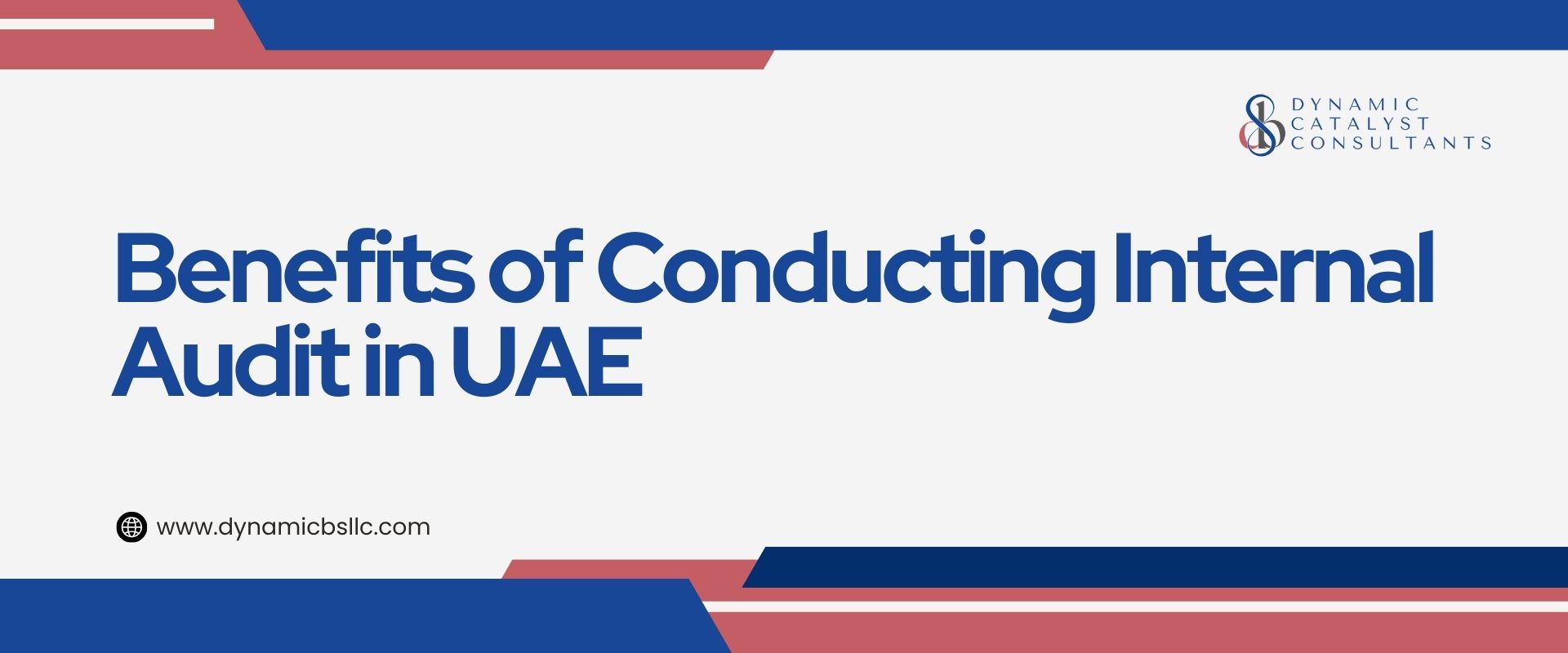The business landscape in the UAE is competitive, fast-paced, and highly regulated. Companies are constantly seeking ways to strengthen corporate governance, risk management, and compliance while improving operational efficiency. One of the most effective strategies to achieve this is conducting an internal audit in UAE.
An internal audit is not just about checking numbers—it is a comprehensive process that examines internal controls, risk exposure, compliance frameworks, and business performance. Whether you are a multinational company, an SME, or a startup, engaging professional internal auditors in Dubai or other emirates can provide insights that protect assets, enhance transparency, and improve profitability.
This article provides a complete breakdown of the benefits of internal audits, tailored to the UAE market, with deep insights into why they are vital for sustainable business success.
Table of Contents
What is an Internal Audit?
An internal audit is an independent, objective assurance and consulting activity designed to add value and improve an organization’s operations. Unlike external audits, which primarily focus on financial statements, internal audits cover a wide range of areas such as operational efficiency, compliance, fraud prevention, and governance.
Purpose of Internal Audits
The main purpose of conducting an internal audit in UAE is to evaluate and improve the effectiveness of risk management, internal controls, and governance processes. Internal audits provide stakeholders with assurance that business operations are ethical, efficient, and compliant with local and international regulations.
Why Internal Audit is Important in the UAE
The UAE has become a hub for international businesses, financial institutions, and SMEs. With its expanding economy, companies must comply with UAE corporate laws, tax regulations, anti-fraud measures, and international standards.
Relevance in the UAE Market
- Regulatory Compliance: UAE companies must meet standards set by authorities like the Ministry of Economy, Central Bank of UAE, and ESCA.
- Taxation and VAT: Since the introduction of VAT in UAE, internal audits help businesses remain compliant and avoid penalties.
- Risk Exposure: With rapid digital transformation, risks of fraud, cyberattacks, and financial mismanagement are increasing.
- Investor Confidence: International investors prefer businesses with robust internal audit frameworks.
Key Benefits of Conducting Internal Audit in UAE
Conducting an internal audit in UAE strengthens governance, improves risk management, and enhances compliance with regulations. Businesses benefit from fraud prevention, stronger internal controls, cost savings, and greater investor confidence, ensuring long-term stability and transparent operations in the UAE market.
Strengthening Internal Controls
Internal controls are the backbone of any organization. Through an internal audit, businesses in the UAE can identify gaps in control systems that could lead to errors, fraud, or inefficiency. Strong internal controls ensure that operations run smoothly and financial data remains reliable.
Fraud Prevention and Detection
Fraudulent activities can cause financial loss and reputational damage. Internal auditors in Dubai specialize in detecting suspicious activities, implementing fraud-prevention strategies, and setting up early-warning systems. This is especially important in industries like real estate, banking, and trading, where financial fraud risks are higher.
Improved Risk Management
Every company faces risks—be it operational, financial, or compliance-related. Internal audits provide an independent risk assessment and suggest strategies to mitigate threats before they escalate.
Enhancing Operational Efficiency
By evaluating processes, internal audits highlight inefficiencies and recommend cost-saving measures. Businesses can reduce waste, improve resource allocation, and enhance productivity.
Compliance with Regulations
With evolving UAE corporate governance standards, companies must remain compliant with ESR (Economic Substance Regulations), AML (Anti-Money Laundering), and VAT regulations. Internal audits ensure businesses meet these requirements without disruptions.
Boosting Investor and Stakeholder Confidence
When companies undergo regular internal audit services, they demonstrate accountability and transparency. This increases investor trust, making it easier to attract funding or partnerships.
Strategic Decision-Making
Internal audit reports provide valuable insights that management can use to make informed decisions. From expansion plans to investment strategies, audit findings often influence key business moves.
How Internal Auditors Add Value to Businesses in UAE
Professional internal auditors in Dubai and across the UAE provide independent assessments that highlight weaknesses, reduce fraud risks, and ensure regulatory compliance. Their insights improve operations, optimize resource allocation, and help companies achieve growth while meeting international standards of corporate governance and accountability.
For SMEs
Many SMEs believe audits are only for large corporations. In reality, SMEs in UAE can benefit significantly by preventing mismanagement, improving accounting practices, and complying with VAT and tax obligations.
For Large Corporations
Large companies in Dubai and Abu Dhabi use internal audits to manage multi-branch operations, assess risks in global markets, and maintain compliance with international standards like IFRS.
For Family-Owned Businesses
Family businesses, which form a large part of the UAE economy, often struggle with governance and succession planning. Internal auditors provide frameworks for better accountability and professional management.
Internal Audit vs External Audit
Before investing in audit services, it’s important to understand the difference between internal audit and external audit.
- Internal Audit: Continuous, independent, focused on operations, risks, and compliance. Conducted by internal auditors or third-party consultants.
- External Audit: Conducted annually by independent auditors to verify financial statements and provide assurance to regulators and investors.
Both serve different purposes but complement each other to strengthen business credibility.
Internal Audit Process in UAE
The internal audit process in UAE begins with planning and risk assessment, followed by evidence collection, analysis, and reporting. Professional auditors recommend corrective actions, monitor implementation, and ensure businesses continuously improve efficiency, meet compliance standards, and strengthen their internal controls for long-term resilience.
Step 1: Planning and Risk Assessment
Auditors evaluate business risks and create an audit plan.
Step 2: Fieldwork and Data Collection
Collection of evidence through observation, interviews, and data review.
Step 3: Analysis and Evaluation
Comparison of actual performance with set standards.
Step 4: Reporting
Findings are documented and presented to management.
Step 5: Follow-up and Monitoring
Recommendations are monitored to ensure implementation.
Benefits of Choosing Professional Internal Audit Firms in Dubai
Working with experienced audit firms in Dubai ensures high-quality results.
Expertise in UAE Laws
Audit firms understand UAE-specific compliance requirements, making them better equipped to guide businesses.
Independent Assessment
Third-party internal auditors provide unbiased insights.
Cost-Effective Solutions
Engaging professional auditors prevents costly errors and penalties.
Conclusion
Conducting an internal audit in Dubai, UAE is no longer optional—it’s a strategic necessity. From strengthening internal controls and preventing fraud to ensuring compliance and improving efficiency, internal audits provide comprehensive benefits for businesses of all sizes. By partnering with professional internal auditors in Dubai, companies can enhance transparency, build investor confidence, and achieve sustainable growth in a competitive market.
FAQs
What are the benefits of audit?
The benefits of an audit include fraud prevention, improved internal controls, risk management, compliance assurance, investor confidence, and enhanced operational efficiency.
What are the 7 E’s of auditing?
The 7 E’s of auditing are: Economy, Efficiency, Effectiveness, Ethics, Equity, Evaluation, and Execution.
What are the 5 C’s of audit?
The 5 C’s of audit are: Criteria, Condition, Cause, Consequence, and Corrective Action.
What are the 5 key benefits of the audit planning phase?
Key benefits include identifying risks, setting priorities, resource allocation, improving efficiency, and ensuring compliance.
What are the benefits of the audit plan?
An audit plan ensures structured processes, timely execution, risk mitigation, and better communication between auditors and management.
What are the 7 steps in the audit process?
Planning, Risk Assessment, Fieldwork, Evaluation, Reporting, Review, and Follow-up.
What are the 6 steps of audit?
Preparation, Planning, Data Collection, Testing, Reporting, and Monitoring.
What are the six principles of auditing?
Integrity, Objectivity, Confidentiality, Competence, Independence, and Evidence-based approach.
What are the 6 steps of the audit cycle?
Audit cycle steps are: Planning, Execution, Reporting, Implementation, Review, and Continuous Monitoring.








